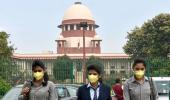People must have tolerance for each other's opinion at a time when the tolerance level has gone down internationally, Supreme Court judge Justice Sanjay Kishan Kaul said on Friday.

On his last working day as an apex court judge, Justice Kaul said boldness of a judge was a very important factor and the bar owes a duty to see that independence of judiciary was protected.
Justice Kaul, who is set to retire on December 25 after a tenure of over six years and 10 months as a judge of the top court, was part of a ceremonial bench which had assembled to bid him farewell.
The Supreme Court will be on winter break from December 18 and will re-open on January 2.
Chief Justice D Y Chandrachud, who was heading the ceremonial bench, recalled his association with Justice Kaul.
"Justice Kaul and I go back to the mid-’70s. We were college students together and I think it is a matter of great honour for me that we share this very dais together with each other, whether it was in Puttaswamy (right to privacy case), whether it was in the marriage equality case, recently in the Article 370 case," Justice Chandrachud said.
The CJI said his friendship with Justice Kaul was a source of "enormous strength" for him.
Justice Kaul said the Supreme Court has administered justice without fear or favour and he feels the institution, a temple of justice, must remain open.
"It is my belief that boldness of a judge is a very important factor. If with the constitutional protection which we have, we are not able to exhibit this, we can't expect other parts of administration to do so," he said.
Justice Kaul said there is no method by which the judiciary can stand up for itself and "I think it is the duty of the bar to support" and also correct the judiciary.
He said he was going out as a "satisfied man."
"...I go with a full sense of satisfaction. I have tried to do my best whatever I could, sometimes it may be the best, sometimes it may not be. But the whole society works in a system where people must have tolerance for each other's opinion," he said, adding, "I think that is the greatest message I would like to give. We are at time in the world, where the tolerance levels have gone very low, internationally..."
"It is time the human species learns to live with each other and live with other species of this world, to be able to adjust to it so that the world remains a large place and does not become a small place," Justice Kaul said while thanking the members of the bar, who had gathered in the court to bid farewell to him.
During his tenure as an apex court judge, Justice Kaul was part of several landmark verdicts, including the one by a nine-judge Constitution bench which had held that right to privacy was a fundamental right.
He was part of a five-judge Constitution bench which had unanimously upheld the Centre's decision to abrogate provisions of Article 370 bestowing special status to the erstwhile state of Jammu and Kashmir.
In his verdict in the matter, Justice Kaul recommended setting up of an "impartial truth and reconciliation commission" to probe and report on human rights violations by both State and non-State actors in Jammu and Kashmir since the 1980s, saying the "wounds need healing."
He was also part of a five-judge Constitution bench which refused to accord legal recognition to same-sex marriage, saying there was "no unqualified right" to marriage with the exception of those that are recognised by law.
A five-judge Constitution bench headed by Justice Kaul had dismissed the Centre's curative plea seeking an additional Rs 7,844 crore from the Union Carbide Corporation's successor firms to extend higher compensation to the victims of the 1984 Bhopal gas tragedy that left over 3,000 people dead and caused environmental damage.
He was also heading a five-judge Constitution bench which had held the apex court has the discretion of exercising the plenary power it commands under Article 142 of the Constitution to dissolve a marriage on the ground of "irretrievable breakdown," and the authority to dispense with the 6-month waiting period mandated under the Hindu Marriage Act, 1955 while granting divorce with mutual consent.
Born on December 26, 1958, he obtained his LLB degree from the Campus Law Centre, Delhi University, in 1982 and enrolled as an advocate with the Bar Council of Delhi on July 15, 1982.
He was designated as a senior advocate in December 1999.
Justice Kaul was elevated as an additional judge of the Delhi high court on May 3, 2001, and was appointed as a permanent judge on May 2, 2003.
He was elevated as the chief justice of the Punjab and Haryana high court with effect from June 1, 2013, and later, assumed charge as the chief justice of the Madras high court on July 26, 2014.
Justice Kaul was appointed as a judge of the Supreme Court on February 17, 2017.











 © 2025
© 2025